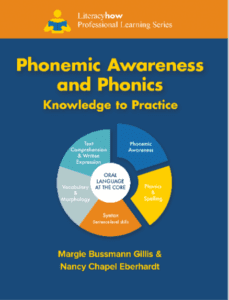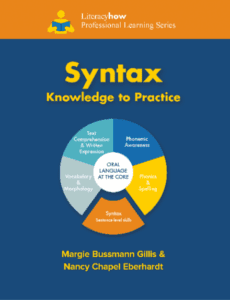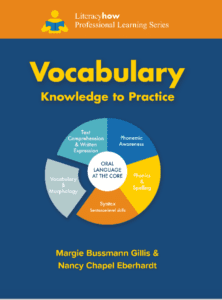Structured Literacy™
Series for Tier 1 Instruction
In this 45-hour course developed by Dr. Margie Gillis, a Certified Academic Language Therapist and founder of Literacy How, we will provide classroom teachers with knowledge to enhance their classroom and Tier 2 instruction.
The Simple View of Reading framework provides a structure to the series acknowledging the importance of explicitly and systematically teaching word recognition skills (i.e., phonemic awareness, decoding, encoding and reading fluency) while simultaneously supporting the development of students’ language comprehension abilities.
The instructional strategies and techniques that teachers will learn may be used with an existing reading program and/or as part of a Structured Literacy approach and will include practical guidance on how to administer and interpret informal assessments for every literacy domain.
Lets Connnect
"*" indicates required fields
Structured Literacy 1 is offered across 9 full day sessions and customized for teachers based on their grade level
our course will include the following topics
Oral Language at the Core: The Foundation for Reading and Writing
Speaking and listening skills are the foundation of literacy. Learn about oral language development and its relationship to language comprehension, reading comprehension and written expression. Understand what the essential language elements are and what their relationship is to literacy while practicing language-building activities that you can bring into your classroom utilizing our Comprehension Handbook.
Grades: PK-5
Phonemic Awareness: What It Is and How to Teach It (Grades PK-1 only)
Learn why phonemic awareness is a necessary prerequisite for learning to read. Understand the developmental sequence of phonological awareness, become comfortable producing the sounds of English, practice segmenting and blending words to five sounds. Learn how to engage children in key instructional strategies and activities that teach this critical skill to mastery utilizing our Phonemic Awareness and Phonics Handbook.
Grades: PK-1
Know the Code: Explicit, Systematic, Differentiated Phonics Instruction
Gain a basic understanding of the history and origins of English and learn about the research supporting phonics instruction. Become familiar with tools for teaching phonics, including words sorts, sound/letter mapping, syllable types, and the purpose and power of decodable text. Learn songs, games, and activities to engage students in word study for differentiated small group instruction utilizing our Phonemic Awareness and Phonics Handbook.
Grades: PK-5
Advanced Code Instruction and Morphology
Learn the rationale behind instruction in the study of affixes (prefixes and suffixes) and Latin roots and Greek combining forms to build students’ vocabulary and improve their spelling. Gain a basic understanding of the history and origins of English and learn about the research supporting phonics instruction. Learn the how and why behind spelling patterns as well as how to incorporate morphology instruction into your language arts instruction utilizing our Vocabulary and Morphology Handbook.
Grades: 2-5 Only
Juicy Vocabulary: Making Words Stick
Vocabulary encompasses several critical dimensions in the area of literacy including word relationships, multiple meaning words, and morphological elements. Learn about the essential components of robust vocabulary instruction and its relationship to reading comprehension. Find out how to select, extend, and maintain words in order to tackle the “30 million word gap” utilizing our Vocabulary Handbook.
Grades: PK-5
Syntax Instruction: The Bridge between Reading Fluency and Comprehension
In order to read fluently and comprehend connected text, students must understand a variety of sentence structures. Learn how to support students’ reading fluency and comprehension by teaching phrasing and sentence structure with a focus on oral language. Find out ways to incorporate grammar and syntax into your language arts block. This workshop will set the stage for the workshop on written expression utilizing our Syntax Handbook.
Grades: PK-5
Reading Comprehension: Understanding Narrative Text
How do the elements of story structure relate to the Common Core State Standards? Learn about the relationship between text structure and sentence structure, the two levels of narrative structure and why narrative texts are so important in building the deep reading brain. Practice analyzing text to identify key story grammar elements and learn effective classroom instructional practices designed to promote comprehension of narratives utilizing our Comprehension Handbook.
Grades: PK-5
Writing is Not a Separate Subject: Explicit Writing Instruction & the Writing Process
Instruction in written expression must include explicit instruction in sentence writing. This workshop will build on the syntax workshop as you identify and recognize the various skills that are necessary for proficient writing. Learn how to recognize students’ developmental stages of writing and the strategies and interventions that support writing at the sentence and discourse levels. Learn how to integrate this systematic and explicit writing instruction into your curriculum using your existing writing program. This workshop will utilize the Syntax and Comprehension Handbooks.
Grades: PK-5
Reading Comprehension: Why and How to Teach Informational Text
The Common Core State Standards emphasize the importance of expository/informational texts. Understand expository text structures, the role of background knowledge and the importance of syntactic structures in text comprehension. Gain an awareness of the types of comprehension problems your students may be having related to text and sentence structure. Understand the literate language requirements of expository text and learn methods and activities that will support students in their comprehension of expository text utilizing our Comprehension Handbook.
Grades: PK-5
All in One: Integrating the Core Components of Literacy Throughout the Day
Evidence supports a multi-componential approach to ensure that our students become proficient readers and writers. This requires teachers to integrate all the elements of Structured Literacy as described and practiced throughout the series in all content areas. This final workshop will engage participants in a discussion of how and where to incorporate what they learned into their whole group and small group instruction. Teachers will leave with how to infuse the practices into your w learned throughout the series for small group and whole group instruction. This workshop will utilize all 4 books in our Professional Learning Series.
Grades: PK-5
Literacy How Professional Learning Series

Phonemic Awareness and Phonics—the keys to breaking the code!

Syntax is essential—even for beginning readers!

Vocabulary knowledge is essential for effective comprehension!

Comprehension is the goal of reading—even for beginning readers!